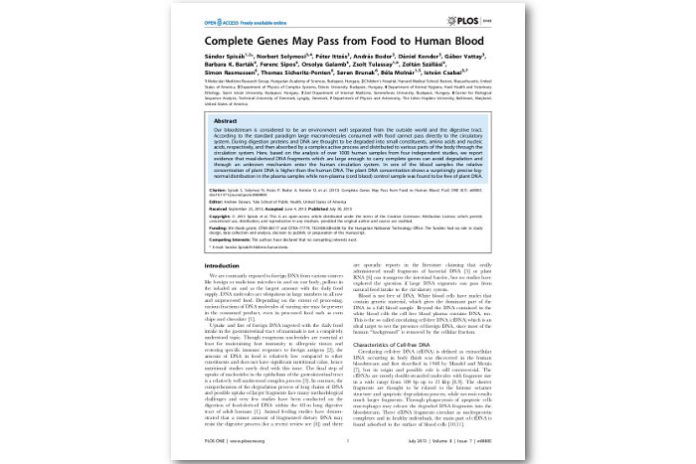Our bloodstream is considered to be an environment well separated from the outside world and the digestive tract. According to the standard paradigm large macromolecules consumed with food cannot pass directly to the circulatory system. During digestion proteins and DNA are thought to be degraded into small constituents, amino acids and nucleic acids, respectively, and then absorbed by a complex active process and distributed to various parts of the body through the circulation system. Here, based on the analysis of over 1000 human samples from four independent studies, we report evidence that meal-derived DNA fragments which are large enough to carry complete genes can avoid degradation and through an unknown mechanism enter the human circulation system. In one of the blood samples the relative concentration of plant DNA is higher than the human DNA. The plant DNA concentration shows a surprisingly precise log-normal distribution in the plasma samples while non-plasma (cord blood) control sample was found to be free of plant DNA.
Authors: Sándor Spisák1,2*, Norbert Solymosi3,4, Péter Ittzés3, András Bodor3, Dániel Kondor3, Gábor Vattay3, Barbara K. Barták5, Ferenc Sipos5, Orsolya Galamb5, Zsolt Tulassay1,5, Zoltán Szállási2, Simon Rasmussen6, Thomas Sicheritz-Ponten6, Søren Brunak6, Béla Molnár1,5, István Csabai3,7
- Molecular Medicine Research Group, Hungarian Academy of Sciences, Budapest, Hungary,
- Children’s Hospital, Harvard Medical School, Boston, Massachusetts, United
States of America, - Department of Physics of Complex Systems, Eo¨tvo¨s University, Budapest, Hungary,
- Department of Animal Hygiene, Herd Health and Veterinary Ethology, Szent Istva´n University, Budapest, Hungary,
- 2nd Department of Internal Medicine, Semmelweis University, Budapest, Hungary,
- Center for Biological Sequence Analysis, Technical University of Denmark, Lyngby, Denmark,
- Department of Physics and Astronomy, The Johns Hopkins University, Baltimore, Maryland, United States of America
Citation: Complete Genes May Pass from Food to Human Blood. PLoS ONE 8(7): e69805. https://doi.org/10.1371/journal.pone.0069805


































